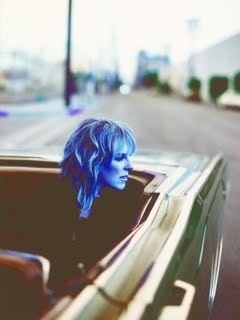Lucinda Williams Just Left Chicago

Friday, October 16, 2009
We both like cars (Photo by Danny Clinch)
Lucinda Williams just left Chicago.
Hey, that sounds like a Z.Z. Top song.
Earlier this week I took in the first two nights of Willliams’ scorching three-night residency at the Park West nightclub—-a former strip joint—in Chicago. The shows stacked up as a 30th anniversary chronological review of the singer-songwriter’s recording career. Williams’ first record consisted of raw blues covers and Hank Williams (no relation) “Jambalya (On the Bayou)” made in 1978 for Smithsonian Folkways, the seminal home of Woody Guthrie, Leadbelly and others. On Tuesday’s opening night at the Park West she told the sparse crowd she was paid $250 to record her “Ramblin’” debut.
Williams, 56, is my favorite female singer-songwriter.
She sings about road trips, Memphis, bad relationships, folk art (I loved her rousing gospel-tinged “Get Right With God” on Wednesday), juke joints, depressing Sundays, more bad relationships, Fats Domino and Z.Z. Top.
What’s not to like about that?
I leaned over to my friend Janet Ray Stoddard at Tuesday’s gig and said, “If I were a woman I’d be Lucinda Williams.”
Janet Ray put down her drink, looked me in the eye and said, “I never thought of that.”
I even sound like Williams: a dry drawl covered with maple syrup. It is why you don’t hear me much on radio.
Back when Williams lived in Nashville I’d stroll into Robert’s Western Wear on Lower Broadway once every year. It’s a great honky tonk with a funky grill and rows of cowboy boots for sale along the wall. Two years in a row I saw Williams at the far end of the bar arguing with some guy. And it wasn’t Steve Earle. Somehow I could relate.
Williams has now been married twice. Someday I might get married a second time.
This is my 20th annivesary of my first conversation with Williams.
I became a hard core fan with the 1989 release of her third album, “Lucinda Williams,” which she made for the defunct Rough Trade label. Her style was already blossoming to include the pure pop chords of “I Just Wanted to See You So Bad” to a mystical groove in which she doused Howlin’ Wolf’s “I Asked for Water (She Gave Me Gasoline).” In 1989 Williams told me it was hard to distance herself from her dogmatic roots in Lake Charles, Louisiana. Her father Miller Williams is a poet-writer who headed the University of Arkansas Press from 1980 through 1997. He read his poem “Of History and Hope” at Bill Clinton’s second inauguration. Her mother was a music major at Louisiana State University. Williams’ parents divorced in the mid-1960s. Both grandfathers were Methodist ministers.
“There’s a real deep-rooted sense of that spirit in my music, but at the same time my father’s agnostic,” she said. “So I grew up in an agnostic household. My father’s father was a conscientous objector in World War I. He was a Christian in the true sense of the word—-liberal, socalist, Democrat. (My grandparents) wore black armbands during the 1969 moratorium. That’s the line I come from. And that’s all in the music.”
Like my favorite male singer-songwriters Bob Dylan, Van Morrison and Neil Young, Williams is free of musical rules. Like Dylan, she learned to write songs without bridges. Williams has only recorded nine studio albums in 30 years, but all corners of my record collection reflect her diverse musical taste by guesting on these tracks: “Cowboys to Girls,” a cover of the Intruders soul hit with the late Chris Gaffney; a cover of Don Gibson’s “Oh Lonesome Me” with M. Ward,” a tasty version of “Honey Chile” for “Goin’ Home: A Tribute to Fats Domino” and “Love Hurts” on the “Welcome to Little Milton” hard blues tribute. There’s many others.
Other songwriters like Joni Mitchell, Carole King and Ani DiFranco do more with wordplay than Williams, but no one captures atmosphere and landscape as well as Williams does. In Bill Buford’s extensive June, 2000 New Yorker piece he called Williams “Raymond Carver with guitar (because of her stark narratives).” That article featured a photo of Williams in her Nashville kitchen. I was astonished out to see she had much of the same kitchen kitsch I have including a Mexican beer tray I bought from my friend Angelo Varias when he ran his Casa Loca store in Chicago.
Now I’m ramblin’ too.





Leave a Response